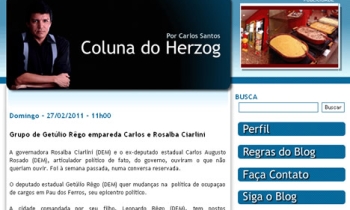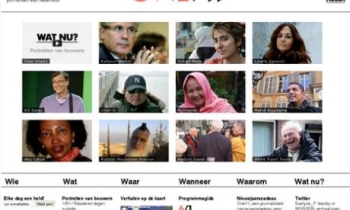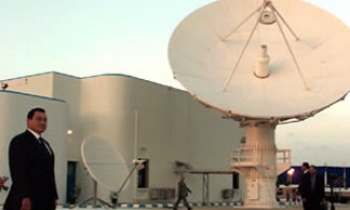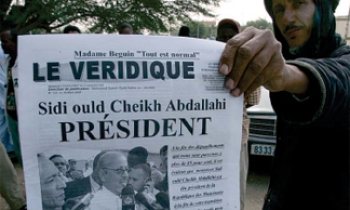Two former top Dow Jones & Co. executives who have long associations with the controlling Bancroft family say they oppose News Corp.'s $5 billion offer to take over the company, the publisher of The Wall Street Journal.
In a sharply worded statement that questions the motives behind News Corp. Chairman Rupert Murdoch's pursuit of the company, James H. Ottaway Jr., a large shareholder, warned that the proposed sale would imperil the "unique news quality and integrity" of the Journal and other Dow Jones publications. (Read the Ottaways' statements.)
Mr. Ottaway accused News Corp. of putting its business interests and political biases before editorial principle. "When Rupert Murdoch's business and news interests conflict, his business interests usually prevail," Mr. Ottaway wrote.
"Rupert Murdoch comes from a very different tradition of Australian-British media ownership and editorial practice in which he has for a long time expressed his personal, political, and business biases through his newspapers and television channels," he added. "We see this every day here in America in his New York Post which regularly runs biased news stories and headlines supporting his friends, political candidates and public policies, and attacks people he personally opposes."
News Corp. rejected Mr. Ottaway's criticism.
"We're disappointed in Mr. Ottaway's comments which unfortunately are based on tired misconceptions and clichés," a News Corp. spokesman said. "The company would be happy to meet with Mr. Ottaway to share with him how we will enhance the journalistic independence and integrity of Dow Jones, while reinvesting in its properties to help it achieve its greatest potential."
In an interview, Mr. Ottaway said he saw no point in meeting with him to discuss the matter. He added that he would consider other offers if the Bancroft family decided to sell to another bidder.
Peter Kann, the former chief executive officer and chairman of Dow Jones who retired last month as chairman, also said he supported the continued independence of the company. "I admire so many of the Bancroft family members, and also the Ottaway family, for taking the position of maintaining Dow Jones as an independent public company," said Mr. Kann, "and thereby ensuring the continued integrity and independence of its journalism and the continued pursuit of its public service mission."
Mr. Kann, a former Pulitzer-Prize-winning reporter who presided over the company from 1991 to 2006, is believed to hold influence over many family members, who supported him for years when the company's stock price languished. Mr. Kann and his wife, former Journal publisher Karen Elliott House, are also shareholders, with less than 1% of total voting power, including options.
One of Mr. Ottaway's sons, James Wells Ottaway, issued a statement of his own, echoing his father's views.
Mr. Ottaway, 69 years old, owns or controls about 6.2% of Dow Jones Class B supervoting shares along with his three children. Together with their common stock, their holdings translate into 5.2% of overall voting power.
So far, Bancroft family members comprising 52% of this voting power have declared their opposition, meaning that shareholders representing at least 57% of Dow Jones stock are against a News Corp. takeover. Michael Elefante, the lawyer who represents much of the Bancrofts' holdings, couldn't be reached. A spokesman for Dow Jones said the company had no comment.
Mr. Ottaway's family has been involved with Dow Jones since 1970 when the company acquired his family's chain of newspapers. The Ottaway Newspapers unit has been a financial anchor for Dow Jones for decades, helping to offset cyclical declines in national advertising at The Wall Street Journal and Barron's.
A former newspaper reporter, James Ottaway Jr. served as president and/or chairman of Ottaway Newspapers for 33 years. Unlike most of the Bancrofts, he has been closely involved with the company. He was president of Dow Jones International print publications from 1988 to 1996, and retired as a Dow Jones board member in 2006 after 17 years. Last year, when Dow Jones sold off six of its Ottaway papers, Mr. Ottaway was opposed to the move, arguing the Ottaway papers added important earnings stability to the company, say some executives. He is also passionate about journalistic issues, serving on several organizations devoted to protecting press freedoms.
He said he decided to publicly voice his opposition because, unlike many of the Bancrofts and others with close ties to the company, securities regulations don't prevent him from speaking. "I can speak my mind freely as an individual shareholder who is very concerned," he said.
Most of the independent directors on Dow Jones's board would support pursuing Mr. Murdoch's offer if it came to the board, according to a person who has been involved in board meetings. Not all directors are enthusiastic about a sale, but "it is hard to say no to that kind of a premium if you're a director," this person said. Chief Executive Rich Zannino spoke in a recent board meeting about the deal's advantages and downsides, said a person who attended. Mr. Zannino has instituted a number of dramatic changes since he took over as CEO of Dow Jones, including replacing much of the company's top management, redesigning The Wall Street Journal and making acquisitions in the digital arena. But those moves have done little for Dow Jones's stock price. As a result, Mr. Zannino sees little possibility of getting Dow Jones's stock to $60 through any measure other than a sale of the company, this person said.
Messrs. Zannino and Murdoch met for breakfast shortly before the $60-a-share written offer was made by Mr. Murdoch, according to a person briefed on the discussions. The two had met prior to that meeting, this person said. Mr. Zannino declined to comment.
Separately, investor Warren Buffett suggested at the Berkshire Hathaway annual meeting in Omaha, Neb., yesterday that he didn't plan to buy any more newspapers (he owns the Buffalo News) and that he thought Dow Jones might attract other offers from bidders who are interested in the prestige and clout conferred by owning The Wall Street Journal and affiliated publications. (Read more on the Berkshire Hathaway annual meeting.)
In his statement, Mr. Ottaway specifically questioned whether The Journal's critical coverage of China, which has won two Pulitzer prizes for the paper in recent years, would be tolerated under ownership by News Corp. The media giant has extensive business holdings there, but has moved to placate government interests in recent years.
In the 1990s, Mr. Murdoch pulled the British Broadcasting Corp. from his satellite service Star TV, making the channel more palatable to the Beijing government. He sold the South China Morning Post to a pro-Beijing businessman. And at his behest, News Corp.'s HarperCollins publishing unit killed a book contract with the last governor of Hong Kong, Chris Patten, all of which were seen as critical of China.
Mr. Ottaway is a director of Human Rights in China, an organization which promotes "democratic reforms and social justice" in that country. He also served as chairman of the World Press Freedom and he endows fellowships at the American Press Institute to promote independent journalism in emerging democracies.
Write to Matthew Karnitschnig at matthew.karnitschnig@wsj.com and Sarah Ellison at sarah.ellison@wsj.com.









